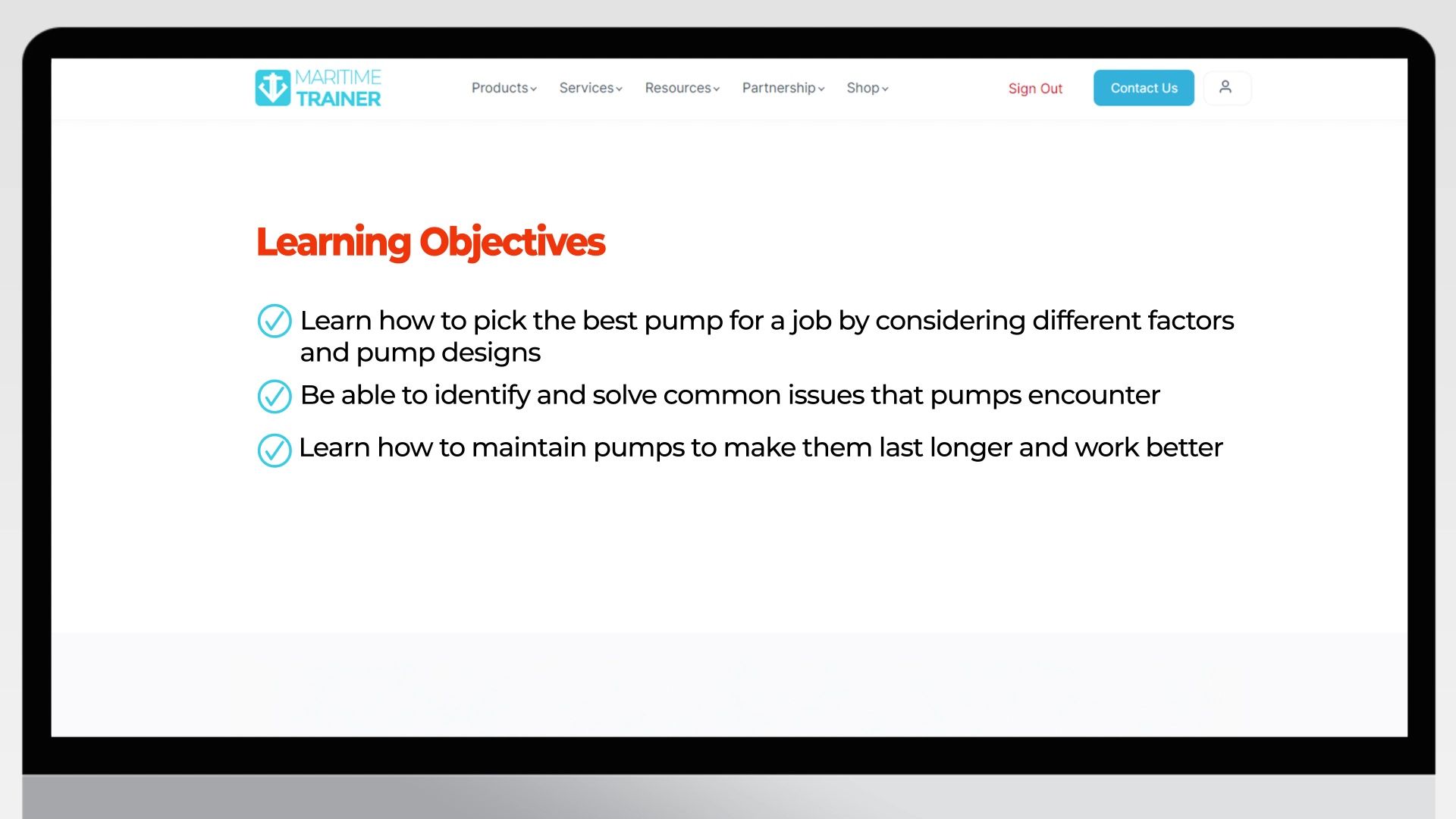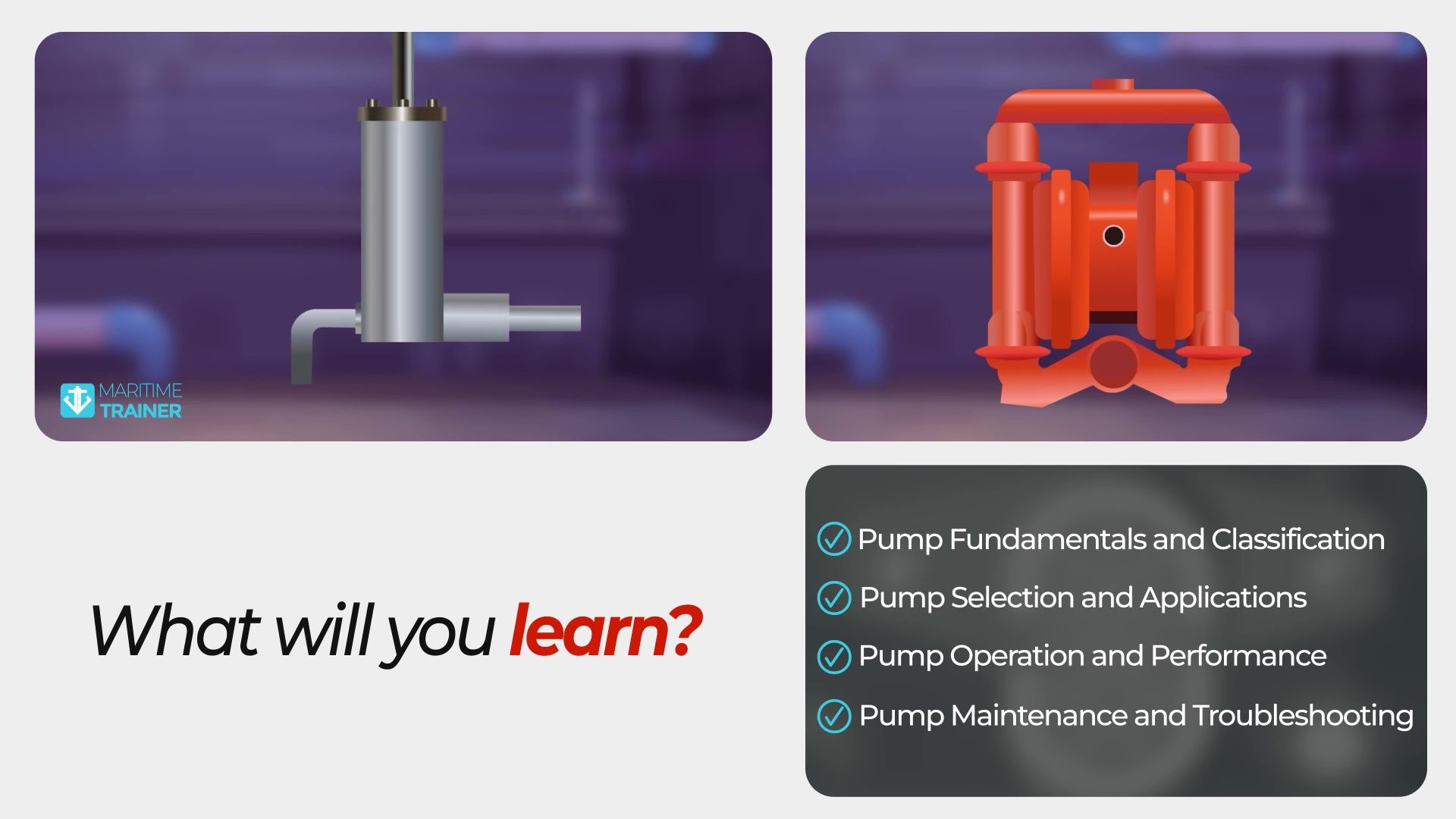Comprehensive Maritime Training on Pump Operations and Design for Maritime Professional
In the maritime industry, understanding the fundamentals of pump operations and design is essential for ensuring efficient and safe vessel operations. Pumps are critical components in various systems on board ships, including cargo handling, ballast control, and bilge management. Proper training in pump operations can significantly enhance a seafarer's ability to select, operate, and maintain these systems, leading to improved operational efficiency and safety. This blog will explore the critical aspects of pump operations, the importance of specialized training, and the benefits of mastering this essential maritime skill.

The Importance of Pump Operations in the Maritime Industry
Pumps are integral to numerous functions on a vessel, from transferring liquids to managing ballast water. Effective pump operations are vital for several reasons:
- Operational Efficiency: Properly selected and maintained pumps ensure smooth and efficient vessel operations, reducing downtime and operational costs.
- Safety: Incorrect pump operation can lead to system failures, posing significant safety risks to the crew and the vessel.
- Environmental Compliance: Efficient pump operations help manage waste and ballast water, ensuring compliance with environmental regulations such as the International Convention for the Control and Management of Ships' Ballast Water and Sediments (BWM Convention).
- Operational Efficiency: Properly selected and maintained pumps ensure smooth and efficient vessel operations, reducing downtime and operational costs.
- Safety: Incorrect pump operation can lead to system failures, posing significant safety risks to the crew and the vessel.
- Environmental Compliance: Efficient pump operations help manage waste and ballast water, ensuring compliance with environmental regulations such as the International Convention for the Control and Management of Ships' Ballast Water and Sediments (BWM Convention).
Critical Components of Pump Operations and Design
Types of Pumps
Understanding the different types of pumps and their applications is crucial for effective pump management. The main categories include:
1. Positive Displacement Pumps:
- Reciprocating Pumps: Utilize a piston or plunger to displace fluid.
- Rotary Pumps: Use gears, screws, or vanes to move fluid.
2. Dynamic Pressure Pumps:
These pumps impart velocity to the fluid, converting kinetic energy into pressure energy. Examples include:
- Centrifugal Pumps: Use a rotating impeller to add velocity to the fluid.
- Axial Flow Pumps: Move fluid along the axis of the pump.
3. Specialized Pumps:
Certain applications require specialized pumps, such as:
- Submersible Pumps: Designed to operate while submerged in the fluid being pumped.
- Framo Cargo Pumping System: This system is used in the marine industry for cargo handling and is known for its efficiency and reliability.
Principles of Pump Operation
To operate pumps effectively, it is essential to understand the fundamental principles governing their operation:
- Hydraulic Principles: Understanding how pressure, flow rate, and head interact is critical for selecting and operating pumps.
- Pump Curves: These graphical representations show a pump's performance characteristics, helping operators select the right pump for specific conditions.
The Role of Training in Pump Operations
Training is paramount for seafarers to master pump operations and design. A comprehensive training program covers the following aspects:
- Categorization and Selection: Learn to categorize pumps based on their characteristics and suitability for specific applications.
- Factors Influencing Selection: To select the appropriate pump, evaluate factors such as fluid properties, system requirements, and efficiency considerations.
- Strengths and Weaknesses: Understand the strengths and weaknesses of various pump designs to make informed decisions.
- Practical Scenarios: Apply theoretical knowledge to practical scenarios, choosing suitable pumps for diverse fluid handling systems.
- Troubleshooting: Diagnose and address common pump issues and malfunctions effectively.
- Preventive Maintenance: Implement maintenance practices to optimize pump performance and lifespan.
Overview of the Pumps Training Course
Course Structure
The Pumps Training Course offered by Maritime Trainer provides an in-depth exploration of various types of pumps and their applications. The course is structured to cover the following topics:

- Introduction to Pump Types: Overview of different pump types and their specific applications.
- Pump Operation Principles: Detailed explanation of pump operations principles, including hydraulic principles and pump curves.
- Selection Criteria: Guidelines for selecting the appropriate pump based on fluid properties, system requirements, and efficiency.
- Maintenance Practices: Best practices for maintaining pumps to ensure optimal performance and longevity.
- Troubleshooting Techniques: Strategies for diagnosing and addressing common pump issues.
Course Details
- Duration: 20 minutes
- Language: English
- Skill Level: Operational
- Assessment: No
- Certificate & Validity: N/A
Who Should Enroll
- Deck Management and Operational Personnel
- Engine Management and Operational Personnel
- Support Personnel
- Electric Operational Personnel
This is applicable to various ship types, including oil tankers, chemical tankers, LNG tankers, general cargo, bulk carriers, containers, passenger vessels, and RORO vessels.
Benefits of Completing the Training
- Enhanced Efficiency: Improved knowledge of pump operations leads to more efficient and reliable vessel operations.
- Safety Improvement: Proper training reduces the risk of pump-related accidents and system failures.
- Cost Savings: Effective pump maintenance and operation can significantly reduce maintenance costs and downtime.
- Environmental Compliance: Training ensures pump operations comply with environmental regulations, minimizing the vessel's environmental impact.
Conclusion
Mastering pump operations and design is critical for maritime professionals to ensure vessel operations' efficiency, safety, and environmental compliance. Comprehensive training provides seafarers with the necessary knowledge and skills to effectively select, operate, and maintain pumps. By following best practices and adhering to industry standards, maritime professionals can significantly enhance the performance and reliability of their vessels.
For more information on our comprehensive Pumps Training Course and to enroll, visit Maritime Trainer or contact us at sales@maritimetrainer.com.
References
- BWM Convention: International Convention for the Control and Management of Ships' Ballast Water and Sediments.
- MARPOL Annex VI: International Convention for Preventing Pollution from Ships, Annex VI - Prevention of Air Pollution from Ships.

Approved & Certified by Bureau Veritas

We are proud to be member of


